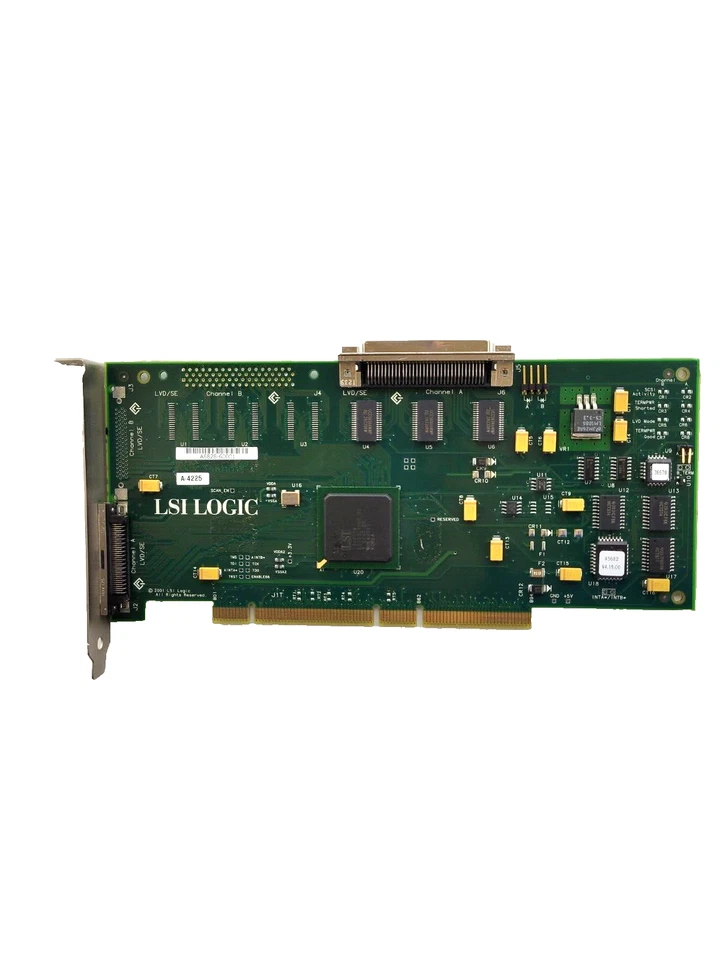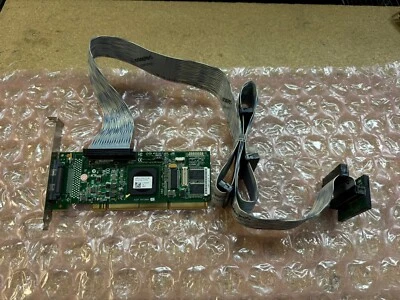Ultra-320 SCSI Internal Interface Card for PCI-X
Shop by category
65 results
Sort: Best Match
- Pre-Owned · HPRM 291.38or Best OfferRM 126.10 shipping
- RM 74.90or Best OfferRM 75.65 shipping
- Very Good - Refurbished · DellRM 174.85or Best OfferRM 154.50 shipping
- RM 52.46Was: RM 58.28was - RM 58.28RM 89.97 shipping
- Excellent - Refurbished · HPRM 73.93Was: RM 74.21was - RM 74.21RM 99.05 shipping
- New (Other) · LSIRM 162.36or Best OfferRM 125.06 shipping
- Excellent - Refurbished · IBMRM 81.54Was: RM 81.81was - RM 81.81RM 99.05 shippingOnly 1 left!
- Excellent - Refurbished · LSIRM 273.08Was: RM 273.35was - RM 273.35RM 99.05 shipping
- Excellent - Refurbished · IntelRM 47.61Was: RM 47.88was - RM 47.88RM 99.05 shipping
- Pre-Owned · HPRM 76.35RM 95.34 shipping
- RM 104.04or Best OfferRM 112.28 shipping
- Pre-Owned · AdaptecRM 241.47or Best OfferRM 131.14 shipping
- RM 62.45or Best OfferRM 113.16 shippingOnly 1 left!
- Pre-Owned · LSIRM 58.28RM 108.87 shipping
- RM 499.54RM 259.33 shipping
- New (Other) · AdaptecRM 228.98Was: RM 520.40was - RM 520.40or Best OfferRM 291.13 shippingOnly 1 left!
- RM 141.55or Best OfferRM 80.10 shipping
- Brand New · TekramRM 291.42or Best OfferRM 24.98 shipping
- Pre-Owned · LSIRM 281.31RM 95.34 shipping
- RM 312.20or Best OfferRM 82.64 shipping
- New (Other) · AdaptecRM 166.32or Best OfferRM 115.61 shipping
- Pre-Owned · AdaptecRM 109.45or Best OfferRM 88.65 shipping
- RM 45.75or Best OfferRM 74.77 shippingOnly 1 left!
- RM 91.55or Best OfferRM 877.10 shipping
- Pre-Owned · AdaptecRM 287.26or Best OfferRM 105.58 shipping
- Brand New · TekramRM 412.16RM 24.98 shipping
- New (Other) · DellRM 537.05or Best OfferRM 159.53 shipping
- Pre-Owned · AdaptecRM 333.01or Best OfferRM 196.63 shipping
- RM 49.96or Best OfferRM 112.78 shipping
- RM 55.58or Best OfferRM 75.06 shipping
- Pre-Owned · LSIRM 86.14Was: RM 95.71was - RM 95.71or Best OfferRM 119.90 shipping
- Pre-Owned · AdaptecRM 124.85or Best OfferRM 79.60 shipping
- Pre-Owned · AdaptecRM 99.88or Best OfferRM 153.50 shipping
- RM 58.28or Best OfferRM 128.43 shipping
- RM 164.18or Best OfferRM 519.89 shipping
- RM 164.18RM 122.53 shipping
- Pre-Owned · AdaptecRM 62.45or Best OfferRM 98.96 shipping
- Pre-Owned · LSIRM 124.85RM 87.55 shipping
- RM 328.35RM 246.26 shipping
- Pre-Owned · AdaptecRM 83.26or Best OfferRM 140.84 shipping
- RM 241.72Was: RM 291.22was - RM 291.22or Best OfferRM 370.90 shipping2 watching
- Pre-Owned · DellRM 75.96or Best OfferRM 79.95 shipping
- RM 164.18or Best OfferRM 519.89 shipping
- RM 283.10or Best OfferRM 157.70 shipping
- RM 99.92RM 1,457.12 shipping
- Pre-Owned · AdaptecRM 45.80or Best OfferRM 122.48 shipping
- Pre-Owned · AdaptecRM 262.41or Best OfferRM 125.87 shipping
- New (Other) · SunRM 204.00RM 1,457.12 shipping
- RM 187.30RM 167.36 shipping
- Pre-Owned · AdaptecRM 93.67or Best OfferRM 99.13 shipping
- RM 35.39or Best OfferRM 112.57 shipping
- Pre-Owned · DellRM 87.51RM 80.34 shipping
- Pre-Owned · AdaptecRM 79.06RM 78.27 shipping
- Pre-Owned · LSIRM 71.09or Best OfferRM 119.30 shipping
- RM 41.63or Best OfferRM 203.79 shipping
- Pre-Owned · DellRM 224.81or Best OfferRM 80.06 shipping5 watching
- RM 109.45or Best OfferRM 120.61 shipping
- RM 55.16or Best OfferRM 203.62 shipping
- RM 74.94RM 123.11 shipping
- RM 83.06RM 109.78 shipping





































































